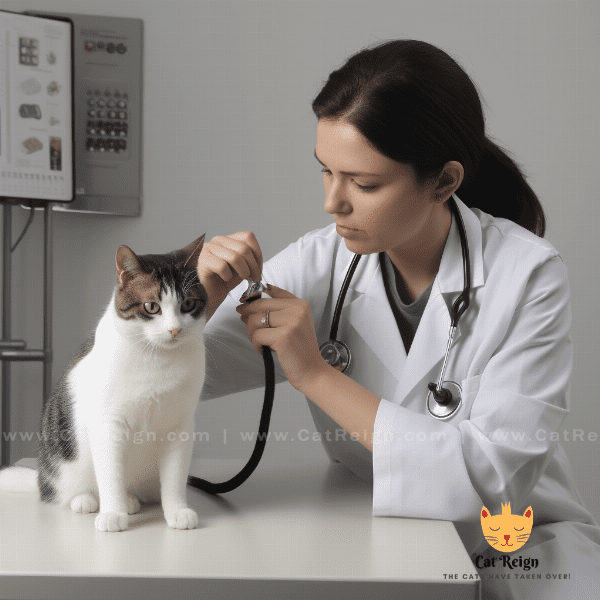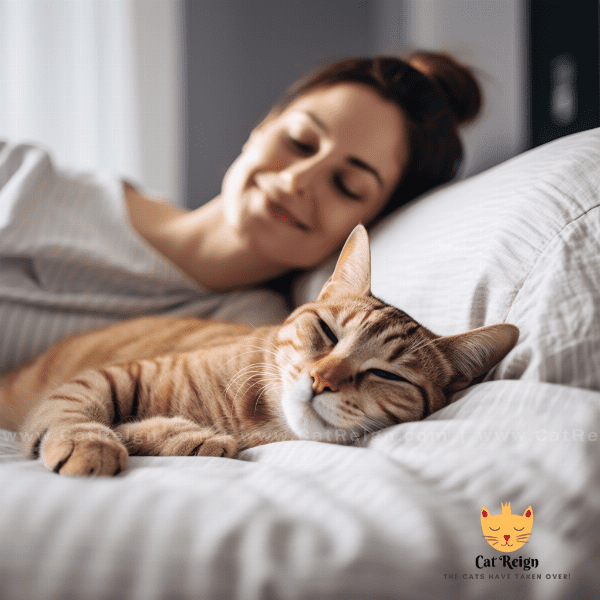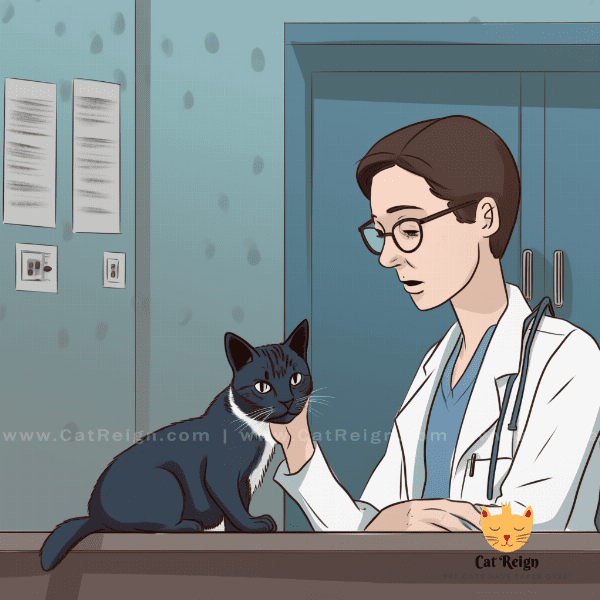Table of Contents
- Understanding the Reason behind Your Cat’s Crying
- Common Triggers that Cause Cats to Cry at Night
- Tips to Soothe Your Cat and Stop the Nighttime Crying
- Creating a Calming and Comfortable Environment for Your Cat
- The Importance of Regular Vet Check-ups for Your Cat’s Health
- Avoiding Common Mistakes that Can Worsen Your Cat’s Crying
- Using Positive Reinforcement to Train Your Cat to Sleep at Night
- Seeking Professional Help: When to Consult a Vet or Cat Behaviorist
- Dealing with Separation Anxiety and Nighttime Crying in Cats
- Maintaining a Healthy Relationship with Your Cat: Love, Care, and Attention.
Understanding the Reason behind Your Cat’s Crying
If your cat is crying at night, it is important to understand that this behavior is not normal. As a responsible pet owner, it is your duty to figure out why your cat is crying and to take appropriate action.
Cats Communicate Through Crying
Cats are not able to communicate with us using words, so they rely on other methods to get their message across. Crying is one of the ways that cats communicate with their owners. When a cat is crying, it is trying to tell you that something is wrong.
Identifying the Underlying Cause
There are several reasons why your cat may be crying at night. Some cats cry because they are hungry or thirsty, while others cry because they are in pain or discomfort. It is important to identify the underlying cause of your cat’s crying in order to provide the appropriate treatment.
Medical Conditions
One of the most common reasons why cats cry at night is because they are suffering from a medical condition. Cats that are in pain or discomfort will often cry as a way of communicating their distress. Some of the medical conditions that can cause cats to cry at night include urinary tract infections, dental problems, and gastrointestinal issues.
Environmental Factors
Environmental factors can also play a role in your cat’s nighttime crying. Cats are sensitive to changes in their environment, and even small changes can cause them to become anxious and stressed. If your cat is crying at night, consider whether there have been any recent changes to their environment, such as a new pet or a change in routine.
Attention-Seeking Behavior
Some cats cry at night simply because they want attention. If your cat is not receiving enough attention during the day, they may resort to crying at night in order to get your attention. While it can be frustrating to deal with this behavior, it is important to remember that your cat is not trying to be difficult – they simply want your attention and affection.
Conclusion
Understanding the reason behind your cat’s crying is the first step towards resolving this behavior. By identifying the underlying cause of your cat’s crying, you can take appropriate action to address the issue and provide your cat with the care and attention that they need. Whether it is a medical condition or a need for attention, it is important to address your cat’s crying in a timely and effective manner.

Common Triggers that Cause Cats to Cry at Night
Cats are creatures of habit, and any changes to their routine or environment can cause them to become anxious and stressed. As a result, there are several common triggers that can cause cats to cry at night.
Hunger and Thirst
One of the most common reasons why cats cry at night is because they are hungry or thirsty. If your cat is not receiving enough food or water during the day, they may become restless and cry at night. To address this issue, make sure that your cat has access to fresh food and water throughout the day.
Pain and Discomfort
Cats that are in pain or discomfort may cry at night as a way of communicating their distress. If your cat has a medical condition that is causing them pain, it is important to seek veterinary care as soon as possible. Your vet can provide the appropriate treatment to alleviate your cat’s pain and discomfort.
Separation Anxiety
Some cats cry at night because they suffer from separation anxiety. Cats that are attached to their owners may become anxious and stressed when they are left alone at night. To address this issue, try to spend more time with your cat during the day and provide them with plenty of affection and attention.
Environmental Changes
Changes to your cat’s environment can also cause them to cry at night. For example, if you have recently moved to a new house or introduced a new pet into the household, your cat may become anxious and stressed. To help your cat adjust to these changes, try to maintain a consistent routine and provide them with a comfortable and familiar environment.
Aging and Cognitive Decline
As cats age, they may experience cognitive decline and become more anxious and restless at night. If your senior cat is crying at night, it is important to provide them with a comfortable and safe sleeping environment. You may also want to consider providing them with a warm and cozy bed to help them feel more secure and comfortable.
Conclusion
Cats cry at night for a variety of reasons, and it is important to identify the underlying cause of your cat’s crying in order to provide the appropriate treatment. Whether it is hunger, pain, separation anxiety, or environmental changes, there are many common triggers that can cause cats to cry at night. By understanding these triggers and addressing them in a timely and effective manner, you can help your cat feel more comfortable and secure at night.

Tips to Soothe Your Cat and Stop the Nighttime Crying
If your cat is crying at night, there are several things you can do to help soothe them and stop the behavior. Here are some tips to help you calm your cat and promote better sleep:
Create a Comfortable Sleeping Environment
Cats are creatures of habit, and they thrive on routine and consistency. To help your cat feel more comfortable and secure at night, create a comfortable sleeping environment for them. This may include a warm and cozy bed, soft blankets, and a quiet and dark room.
Provide Adequate Food and Water
As mentioned earlier, hunger and thirst are common reasons why cats cry at night. To prevent this behavior, make sure that your cat has access to fresh food and water throughout the day. You may also want to consider feeding your cat a small meal before bedtime to help keep them satisfied.
Use Soothing Techniques
There are several soothing techniques that can help calm your cat and promote better sleep. These may include playing calming music, using a pheromone diffuser, or providing your cat with a warm and cozy bed. You may also want to try gently massaging your cat or using a soft brush to help them relax.
Conclusion
Crying at night is not normal behavior for cats, and it is important to take appropriate action to address the issue. By creating a comfortable sleeping environment, providing adequate food and water, spending quality time with your cat, addressing medical issues, using soothing techniques, and avoiding reinforcing negative behavior, you can help soothe your cat and stop the nighttime crying. With a little patience and perseverance, you can help your cat get the restful sleep they need to stay healthy and happy.

Creating a Calming and Comfortable Environment for Your Cat
A calm and comfortable environment is essential for your cat’s overall well-being and can help prevent nighttime crying. Here are some tips for creating a calming and comfortable environment for your cat:
Provide a Safe and Secure Space
Cats need a space that they can call their own, where they feel safe and secure. Provide your cat with a designated space, such as a cozy bed or a comfortable cat tree, where they can retreat to when they need some alone time.
Control Noise Levels
Cats are sensitive to noise and can become anxious and stressed when there is too much noise in their environment. To create a calming environment for your cat, try to minimize noise levels as much as possible. This may include closing windows, using soundproofing materials, or moving your cat’s sleeping area to a quieter location.
Use Soft Lighting
Soft lighting can help create a calming and relaxing environment for your cat. Use low-wattage bulbs or dimmer switches to create a cozy atmosphere in your cat’s sleeping area. Avoid using bright lights or harsh fluorescent lighting, which can be too stimulating for your cat.
Keep the Area Clean
Cats are fastidious animals and need a clean and hygienic environment to feel comfortable. Keep your cat’s sleeping area clean and free of debris, and make sure that their litter box is cleaned regularly.
Provide Stimulation
Cats need stimulation and enrichment to keep their minds active and engaged. Provide your cat with toys, scratching posts, and other interactive items to keep them entertained and stimulated.
Use Pheromone Diffusers
Pheromone diffusers can help create a calming environment for your cat by releasing synthetic pheromones that mimic the natural pheromones produced by cats. These pheromones can help reduce stress and anxiety in cats and promote relaxation.
Conclusion
Creating a calming and comfortable environment is essential for your cat’s well-being and can help prevent nighttime crying. By providing a safe and secure space, controlling noise levels, using soft lighting, keeping the area clean, providing stimulation, and using pheromone diffusers, you can help create a relaxing environment for your cat. With a little effort and attention to detail, you can help your cat feel calm, comfortable, and content in their sleeping space.

The Importance of Regular Vet Check-ups for Your Cat’s Health
Regular vet check-ups are essential for maintaining your cat’s health and well-being. Here are some reasons why you should schedule regular check-ups for your feline friend:
Early Detection of Health Issues
Cats are experts at hiding their health issues, and it can be difficult to detect a problem until it has progressed. Regular vet check-ups can help detect health issues early, before they become serious. Your vet can perform a thorough physical exam, check your cat’s vital signs, and run blood tests to detect any health issues.
Prevention of Health Problems
Prevention is always better than cure, and regular vet check-ups can help prevent health problems from occurring in the first place. Your vet can provide advice on nutrition, exercise, and preventive measures, such as vaccinations and parasite control, to keep your cat healthy.
Early Detection of Behavioral Issues
Behavioral issues can also be detected during a vet check-up. Your vet can ask questions about your cat’s behavior, such as whether they are crying at night or exhibiting any unusual behaviors, and provide advice on how to address any issues.
Management of Chronic Conditions
If your cat has a chronic condition, such as diabetes or kidney disease, regular vet check-ups are essential for managing the condition. Your vet can monitor your cat’s condition and provide advice on medications, diet, and other management strategies to keep your cat healthy and comfortable.
Maintenance of Dental Health
Dental health is an important aspect of your cat’s overall health and well-being. Regular vet check-ups can help maintain your cat’s dental health by checking for signs of dental disease and providing advice on dental care.
Conclusion
Regular vet check-ups are essential for maintaining your cat’s health and well-being. By detecting health issues early, preventing health problems, detecting behavioral issues, managing chronic conditions, and maintaining dental health, your vet can help keep your cat healthy and happy. Don’t wait until your cat is sick to schedule a check-up – make sure to schedule regular appointments with your vet to ensure your cat’s ongoing health and wellness.

Avoiding Common Mistakes that Can Worsen Your Cat’s Crying
If your cat is crying at night, it can be tempting to resort to quick fixes that may actually make the problem worse. Here are some common mistakes to avoid when dealing with your cat’s nighttime crying:
Ignoring the Problem
Ignoring your cat’s nighttime crying is not a solution. It is important to address the underlying cause of the behavior in order to prevent it from getting worse.
Punishing Your Cat
Punishing your cat for crying at night can be counterproductive. Cats do not respond well to punishment, and it can actually make the behavior worse. Instead, try to address the underlying cause of the behavior and provide positive reinforcement when your cat is calm and quiet.
Reinforcing Negative Behavior
Reinforcing negative behavior, such as crying at night, can inadvertently reinforce the behavior. For example, if you respond to your cat’s crying by providing them with food or attention, you may inadvertently reinforce the behavior. Instead, try to ignore the crying and only provide attention and affection when your cat is calm and quiet.
Inconsistency in Routine
Cats thrive on routine and consistency, and any changes to their routine can cause them to become anxious and stressed. Avoid making any sudden changes to your cat’s routine, such as changes to their feeding schedule or sleeping area.
Inadequate Attention
Cats that do not receive enough attention during the day may become restless and cry at night. Make sure that you spend quality time with your cat during the day, and provide them with plenty of attention and affection.
Conclusion
Avoiding common mistakes is essential when dealing with your cat’s nighttime crying. By avoiding mistakes such as ignoring the problem, punishing your cat, reinforcing negative behavior, inconsistency in routine, and inadequate attention, you can help prevent the behavior from getting worse. With a little patience and perseverance, you can address the underlying cause of your cat’s crying and help them get a good night’s sleep.

Using Positive Reinforcement to Train Your Cat to Sleep at Night
Positive reinforcement is a powerful tool for training your cat to sleep at night. Here are some tips for using positive reinforcement to train your cat:
Reward Good Behavior
When your cat sleeps through the night without crying, reward them with a treat or praise. This will help reinforce the behavior and encourage your cat to repeat it.
Create a Bedtime Routine
Creating a bedtime routine can help signal to your cat that it is time to sleep. This routine may include feeding your cat a small meal, providing them with a cozy bed, and spending some quiet time with them.
Use Interactive Toys
Interactive toys can help tire out your cat and promote relaxation. Use toys such as puzzle feeders or toys that require your cat to chase or hunt to help tire them out before bedtime.
Use Calming Scents
Calming scents, such as lavender or chamomile, can help promote relaxation and calmness in cats. Use a diffuser or spray that contains these scents in your cat’s sleeping area to help them relax and sleep more soundly.
Avoid Negative Reinforcement
Negative reinforcement, such as punishing your cat for crying at night, can be counterproductive and make the behavior worse. Instead, focus on reinforcing good behavior and ignoring negative behavior.
Be Consistent
Consistency is key when training your cat to sleep at night. Stick to a routine and be patient with your cat as they learn to adjust to the new routine.
Conclusion
Using positive reinforcement can be a powerful tool for training your cat to sleep at night. By rewarding good behavior, creating a bedtime routine, using interactive toys and calming scents, avoiding negative reinforcement, and being consistent, you can help your cat learn to sleep through the night. With patience and perseverance, you can train your cat to sleep soundly and help prevent nighttime crying.

Seeking Professional Help: When to Consult a Vet or Cat Behaviorist
If your cat continues to cry at night despite your best efforts, it may be time to seek professional help. Here are some signs that it may be time to consult a vet or cat behaviorist:
Persistent Crying
If your cat’s nighttime crying persists despite your efforts to address the underlying cause, it may be time to seek professional help. A vet or cat behaviorist can help identify the cause of the behavior and provide appropriate treatment.
Changes in Behavior
If your cat’s behavior has changed in other ways, such as aggression or lethargy, it may be a sign of an underlying medical condition. A vet can perform a thorough exam and run diagnostic tests to identify any health issues.
Medical Issues
If your cat’s nighttime crying is due to a medical issue, such as pain or discomfort, it is important to seek veterinary care as soon as possible. Your vet can provide the appropriate treatment to alleviate your cat’s pain and discomfort, and help them get a good night’s sleep.
Behavioral Issues
If your cat’s nighttime crying is due to a behavioral issue, such as anxiety or stress, a cat behaviorist can help identify the underlying cause of the behavior and provide appropriate treatment. This may include behavior modification techniques, such as positive reinforcement training or environmental changes.
Conclusion
If your cat continues to cry at night despite your efforts to address the behavior, it may be time to seek professional help. A vet or cat behaviorist can help identify the underlying cause of the behavior and provide appropriate treatment. Whether the behavior is due to a medical issue or a behavioral issue, seeking professional help can help ensure that your cat gets the care and treatment they need to sleep soundly and stay healthy.

Dealing with Separation Anxiety and Nighttime Crying in Cats
Separation anxiety can be a common cause of nighttime crying in cats. Here are some tips for dealing with separation anxiety and nighttime crying in cats:
Gradual Departures and Returns
If your cat becomes anxious when you leave, try to make your departures and returns gradual. This may include spending some time playing or cuddling with your cat before leaving, and returning home quietly and without fanfare.
Create a Comfortable Environment
Create a comfortable and secure environment for your cat by providing them with a cozy bed or a comfortable hiding spot. This can help them feel safe and secure when you are not around.
Interactive Toys and Puzzles
Interactive toys and puzzles can help keep your cat entertained and distracted while you are away. Use toys that require your cat to work for their food or toys that provide mental stimulation to help tire them out and prevent boredom.
Pheromone Diffusers
Pheromone diffusers can help reduce anxiety and promote relaxation in cats. Use a diffuser that contains synthetic pheromones in your cat’s sleeping area or around your home to help reduce anxiety and stress.
Addressing Underlying Issues
If your cat’s separation anxiety and nighttime crying persists despite your efforts, it may be time to consult with a vet or cat behaviorist. They can help identify any underlying issues, such as medical conditions or behavioral issues, and provide appropriate treatment.
Conclusion
Dealing with separation anxiety and nighttime crying in cats can be challenging, but with patience and perseverance, you can help your cat feel more secure and comfortable. By creating a comfortable environment, using interactive toys and puzzles, using pheromone diffusers, and addressing underlying issues, you can help reduce your cat’s anxiety and prevent nighttime crying. With a little time and effort, you can help your cat feel calm, relaxed, and content, even when you are not around.

Maintaining a Healthy Relationship with Your Cat: Love, Care, and Attention.
Maintaining a healthy relationship with your cat is essential for their physical and emotional well-being. Here are some tips for building a strong and healthy bond with your feline friend:
Love and Attention
Cats thrive on love and attention, and providing them with plenty of affection and attention can help build a strong bond. Spend quality time with your cat each day, petting them, playing with them, and talking to them.
Proper Nutrition and Exercise
Proper nutrition and exercise are essential for your cat’s physical health and well-being. Provide your cat with a balanced and nutritious diet, and make sure they get plenty of exercise and playtime.
Regular Grooming
Regular grooming is important for maintaining your cat’s health and hygiene. Brush your cat’s fur regularly, trim their nails, and clean their ears and teeth to keep them healthy and comfortable.
Playtime and Enrichment
Playtime and enrichment are important for your cat’s mental and emotional well-being. Provide your cat with plenty of toys and opportunities for play and exploration to keep them stimulated and engaged.
Respect Your Cat’s Boundaries
Respect your cat’s boundaries and avoid forcing them to do anything they are uncomfortable with. Cats thrive in a calm and peaceful environment, so avoid any loud or disruptive behavior that may make your cat anxious or stressed.
Conclusion
Maintaining a healthy relationship with your cat requires love, care, and attention. By providing your cat with love and attention, proper nutrition and exercise, regular grooming, playtime and enrichment, and respecting their boundaries, you can build a strong and healthy bond with your feline friend. With a little time and effort, you can ensure that your cat stays happy, healthy, and content for years to come.




